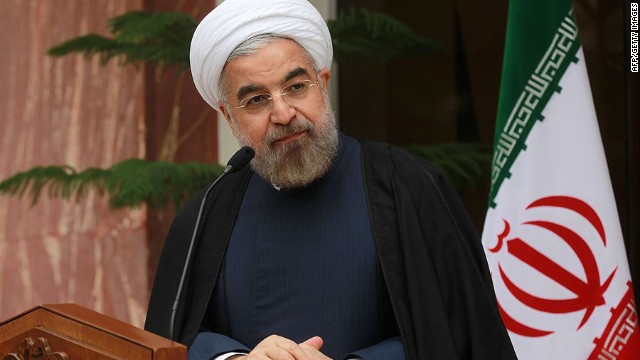 (CNN)�-- Another sign of new rapprochement with Western culture, or�a cynical public relations ploy?
(CNN)�-- Another sign of new rapprochement with Western culture, or�a cynical public relations ploy?Iran's top leaders used Twitter to send Christmas greetings that praised Jesus, continuing a new era of social media outreach by a government previously known for Islamic extremism and political belligerence.
"May Jesus Christ, Prophet of love & peace, bless us all on this day. Wishing Merry #Christmas to those celebrating, esp Iranian Christians," said a tweet from the official account of Iranian President Hassan Rouhani.
In response to Rouhani, the Shiite Muslim country's hardline Supreme Leader, Ayatollah Ali Khamenei, tweeted back: "No doubt that Jesus #Christ has no less value among Muslims than [he has] among the pious Christians."
Another tweet from Khamenei's account said that "Jesus #Christ, the Son of #Mary, was a herald of God's grace, blessing & guidance for man."
The messages come as Iran seeks to reshape its relationship with the United States and other Western powers more than three decades after the Islamic revolution launched an era of diplomatic estrangement.
Its economy crippled by international sanctions over its nuclear program, Iran recently agreed to freeze some nuclear development efforts in exchange for the easing of some sanctions while talks continue on a final deal that U.S. officials say would prevent Tehran from building a nuclear weapon.
However, Israel and some U.S. legislators warn that Iran was manipulating President Barack Obama's administration and its allies in the talks without intending to truly give up its quest for a nuclear weapon.
Rouhani insists Iran's nuclear program is for peaceful purposes, and U.S. Secretary of State John Kerry says the negotiations will show if that's true because a final agreement will require Iran to give up the technology to develop weapons of mass destruction.
The chief Iranian nuclear negotiator, Foreign Minister Javad Zarif, joined in some of the Christmas tweeting from Tehran.
"May the spirit of Christmas bring joy, peace, empathy and compassion to everyone throughout the coming year. Merry Christmas," said a post on his account.
The messages came from leaders of an Islamic republic in which religious minorities are not completely free to participate in the Iranian government and often face discrimination.
While Jews and Christians can to some extent worship openly in Iran, the government cracks down on converts from Islam and any effort to proselytize faith other than Muslim.
"There are thousands of cases of discrimination against religious minorities like the Baha'is and others who express their own beliefs or any other belief than what the theocratic regime of Iran impose," noted Katrina Lantos Swett, the vice chairwoman of the U.S. Commission on International Religious Freedom, in an interview last year with CNN.
In 2012, Iran arrested Saeed Abedini, a U.S. citizen who is a Christian convert and was openly preaching his Christian beliefs. He remains imprisoned in Iran, and his wife and others criticized the Obama administration for not negotiating his release as part of the nuclear talks.
Iranian leaders have offered Christmas messages in the past citing the teachings of Jesus, who is considered a prophet in Islam.
Former President Mahmoud Ahmedinejad, a hardliner notorious for virulent anti-Israel rhetoric, had on occasion issued positive statements about Christmas or Rosh Hashanah, the Jewish celebration of a new year.
He was much more widely known, however, for saying that Israel should be eliminated and calling the Holocaust a myth. Usually, Ahmadinejad would caution that he was criticizing "Zionists," not all Jews.
The more moderate Rouhani easily won the June election to succeed Ahmedinejad, then signaled a major shift when a tweet in September on his English-language account said: "As the sun is about to set here in #Tehran I wish all Jews, especially Iranian Jews, a blessed Rosh Hashanah."
At the opening of the U.N. General Assembly that same month, Rouhani promised that Iran had the political will to reach nuclear agreement with the United States and its allies.
Rumors that he would meet with Obama in New York proved unfounded, but the two men spoke by telephone before Rouhani flew home -- the first direct conversation between U.S. and Iranian top leaders since the 1979 Islamic Revolution.
Over the weekend, Rouhani made clear his intention to ease tensions with the West. A post on his Twitter account declared: "We want to rebuild and improve our relations to European and North American countries on a basis of mutual respect."
The Christmas tweets continued the Iranian outreach, this time joined by Khamenei , whose account included multiple tweets that implied Jesus might side with Iran against what he has in the past criticized as Western imperialism.
"If #Christ were among us today, he would not spare even a single moment to fight the despotism &global #arrogance," said one of the tweets on Khamenei's account.
Khamenei's messages appeared to be an effort to communicate directly with the international community by the 74-year-old religious cleric.
It was impossible to know who actually writes on the Twitter accounts of Rouhani and Khamenei, while Zarif, a fluent English speaker, previously has said he writes his own tweets.
Just the existence of official accounts for Rouhani and Khamenei makes them authoritative in a nation where Twitter and other social media websites such as Facebook and YouTube are controlled and limited.
In an interview with CNN in September, Iranian Tourism Minister Mohammad-Ali Najafi said he expected more openness to social media under Rouhani, a close political ally.
"Social media is actually a great tool that can be used to express beliefs and reveal the reality and truth," Najafi said. "During the previous administration, social media and the Iranian's presence on social media was considered to be illegal. But I think based on the policies of the new administration, there would certainly be changes made in those limitations."
By CNN
The Iran Project is not responsible for the content of quoted articles.











